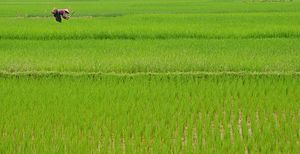Later this week, Vietnam will host regional leaders at the Asia-Pacific Economic Cooperation meeting (APEC) in Danang. As the spotlight shines on the Southeast Asian state even as it confronts the fallout from a recent typhoon, it is worth looking more closely at where its own economy stands today.
Fiscally, Vietnam has endured a roller-coaster ride since opening its economy during the Doi Moi era of the late 1980s and 1990s, with spectacular booms and busts marked by extraordinary examples of gross corruption within government and without. This was highlighted by the near collapse of the banking industry and the trial of 50 bankers in what has widely been regarded as one of the largest graft cases in Vietnamese history.
However, Vietnam has also sought to buffer itself by broadening its economic base and gradually limiting its reliance on China, where excessive debt and slowing growth have sharply crimped growth and curtailed exports from elsewhere in ASEAN.
Growth rates in Vietnam have regularly checked in at between 6 and 6.5 percent – a fairly promising rate in the developing world. But according to Focus Economics, annual growth soared to 7.5 percent in the third quarter, up from 6.3 percent in the previous quarter, and despite a protracted downturn in mining and oil output.
“Stellar growth in the manufacturing sector, a strong service sector, surging inflows of FDI, and a boost in private consumption buoyed by a rapid rise in private-sector credit, propelled the fastest economic expansion in over nine years,” Focus Economics said.
“Robust growth in Q2 and Q3 puts the economy within reach of the government’s ambitious full-year GDP growth target of 6.7 percent for 2017, which had seemed out of sight following a disappointing performance in Q1,” according to the economic outlook. It also noted a rebound in agricultural output following a recovery from the effects of severe drought last year.
Te World Bank outlook for the Southeast Asian country is also positive, noting, that agriculture was gradually improving even “though the recovery is still fragile.”
“Vietnam’s economy is strong, as a result of strong momentum of Vietnam’s fundamental growth drivers — domestic demand and export-oriented manufacturing,” said Sebastian Eckardt, lead economist and acting Country Director for the World Bank in Vietnam.
That should bode well. Vietnam needs a period of stable growth, along with broader social reforms and freedom for religious and indigenous groups, if it is to set the tone to eventually make its mark as a tolerant, aspiring middle-class nation. That is a goal that has eluded it thus far.
Abroad, despite Vietnam’s continuing attempts to seek balance in its foreign policy, an assertive China led by a strengthened Xi Jinping, an unpredictable United States under U.S. President Donald Trump, and the continued divisions within ASEAN, are both increasingly dragging Hanoi into the orbit of the United States and its allies and major partners.
That means Japan’s bid to salvage the Trans-Pacific Partnership (TPP), ditched by Trump after he came to office, deserves Hanoi’s support while the United States gets its economic strategy for the region sorted out. In the meantime, the focus for Vietnam has been on smaller steps, with the United States and Vietnam signing off on $8 billion worth of deals, including a big contract with a Vietnamese budget carrier.
Such alignment shifts are not merely political; they have economic implications too. How countries like the United States and Japan fare is a critical variable that will factor into calculations about whether financial rewards could be great and more than cover potential losses caused by any alienation from China.
As Vietnam gears up for APEC, it is clear that its economy holds promise despite lingering challenges, and that its foreign policy has accorded it a greater role in an uncertain region. What the future holds, however, is much less clear, and only some of that is in Vietnam’s own hands.
Luke Hunt can be followed on Twitter @lukeanthonyhunt. His new book, the Punji Trap, is expected to be released shortly.

































